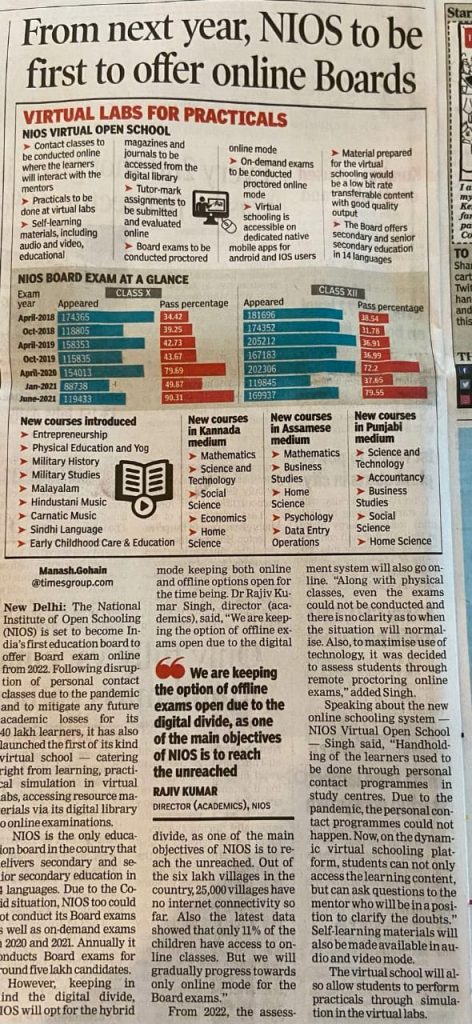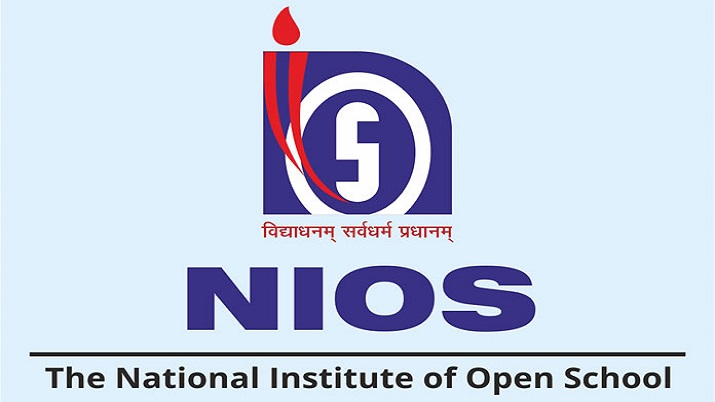National Institute of
Open Schooling
NIOS
The Largest Open Schooling System in the World and an Examination Board of the Government of India at par with CBSE/CISCE.
ISO 9001:2008 Certified
An autonomous Institution under Department of School Education & Literacy, Ministry of Education, Government of India.
Learner Support Centre Toll Free No.: 1800 180 9393, E-mail: [email protected]

What is NIOS?
In July 2002, the Ministry of Education (MOE) amended the nomenclature of the organisation from the National Open School (NOS) to the National Institute of Open Schooling (NIOS) with a mission to provide relevant continuing education at school stage, up to pre-degree level through Open Learning system to prioritized client groups as an alternative to formal system, in pursuance of the normative national policy documents and in response to the need assessments of the people, and through it to make its share of contribution:
– To universalization of education
– To greater equity and justice in society
– To the evolution of a learning society
NIOS operates through a network of five Departments, 23 Regional Centres, two Sub Regional Centres, two NIOS Cells, and more than 7400 Study Centres (AIs/AVIs) spread all over the country and abroad. NIOS is the largest Open Schooling system in the world with cumulative enrolment of 4.13 million (during last 5 years).

NIOS is “Open School” to cater to the needs of a heterogeneous group of learners up to pre-degree level. It was started as a project with in-built flexibilities by the Central Board of Secondary Education (CBSE) in 1979. In 1986, the National Policy on Education suggested strengthening of Open School System for extending open learning facilities in a phased manner at secondary level all over the country as an independent system with its own curriculum and examination leading to certification.
Consequently, the Ministry of Education (MOE) , Government of India set up the National Open School (NOS) in November 1989. The pilot project of CBSE on Open School was amalgamated with NOS. Through a Resolution (No. F.5-24/90 Sch.3 dated 14 September 1990 published in the Gazette of India on 20 October 1990), the National Open School (NOS) was vested with the authority to register, examine and certify students registered with it up to pre-degree level courses.
Reasons to Choose
NIOS
Freedom to Learn
Freedom to Learn
Flexibility
Flexibility
Relevance
Relevance
Transfer of Credits
Transfer of Credits
Recognized Quality Education
Recognized Quality Education
Frequently Asked Questions
Most of your questions about NIOS are answered here
The NIOS has 100% Online admission at the Secondary and the Senior Secondary Education levels in order to facilitate learners to register.
Under this scheme, the learner has three options:
– Learner can register online directly by visiting the website of NIOS e., www.nios.ac.in and sdmis.nios.ac.in.
– Learner may visit his/her nearest AI (Study Centre)/Facilitation Centre and take help for online
– Learner may visit the concerned Regional Centre of NIOS and take help for online
– Learner can use the services of the Common Services Centres of the Govt. of India for Online registration throughout the country
– A learner who has passed class VIII and has a valid proof that Learner has attained 14 years of age can apply for registration to the Secondary Course.
– The learner who gives a self certificate stating that “I have studied and able to pursue the secondary course” is also eligible for admission to the Secondary
– The learner who had studied at the Secondary level can also seek admission in NIOS either to complete his course or to improve his
– Residential proof of the learner
The certificate of date of birth issued by a Municipal Corporation, a Municipal Body, a Village Panchayat or any other body authorised by the Registrar, Birth and Death, Government of India, and the Aadhaar Card issued by some Govt. Agency is a valid proof of date of birth. However, in case of orphans, street children etc., a medical certificate in respect of age issued by a Government Hospital is also acceptable as a valid proof of date of birth.
The Admission (once registered) is valid for a period of 5 years from the date of admission.
The fee concession is provided to females, SC/ST/Ex-Servicemen and differently abled/Divyang learners as per NIOS norms.
No. In order to take admission in the Senior Secondary course, the learner must have passed the Secondary course from a recognised Board.
The minimum age to take admission in the Senior Secondary Course is 15 years.
The NIOS offers the Secondary course in English, Hindi, Urdu, Marathi, Odia, Telugu, Gujarati, Tamil, Malayalam, Punjabi, Assammese, Sanskrit and Kannada mediums; and the Senior Secondary course in English, Hindi, Odia, Bengali, Gujarati, Sanskrit and Urdu mediums.
Hindi, English, Urdu, Sanskrit, Bengali, Odia, Marathi, Telugu, Gujarati, Kannada, Punjabi, Assamese, Nepali, Malayalam, Arabic, Persian, Tamil, Sindhi, Mathematics, Science and Technology, Social Science, Economics, Business Studies, Home Science; Psychology, Indian Culture and Heritage, Painting, Data Entry Operations, Accountancy, Hindustan Sangeet, Carnatic Sangeet, Veda Adhyan, Sanskrit Vyakaran, Bharatiya Darshan, Sanskrit Sahitya, Entrepreneurship. (36 subjects including 18 languages).
Hindi, English, Bengali, Odia, Tamil, Urdu, Sanskrit, Gujarati, Punjabi, Persian, Arabic, Malyalam, Mathematics, Physics, Chemistry, Biology, History, Geography, Political Science, Economics, Business Studies, Accountancy, Home Science, Psychology, Computer Science, Sociology, Painting, Environmental Science, Mass Communication, Data Entry Operations, Introduction to Law, Library and Information Science, Veda Adhyan, Sanskrit Vyakaran,
Bharatiya Darshan, Sanskrit Sahitya, Physical Education and Yog, Military Studies, Military History and Early Childhood Care and Education (41 subjects including 12 languages).
Yes. A learner has the option to change one or more subjects, provided the total number of subjects does not exceed seven. Subjects already passed cannot be changed.
For obtaining a pass certificate at the Secondary level, a learner is required to pass in minimum five subjects including one or maximum two languages.
Yes. A learner can opt upto two additional subjects. Thus, in all, a learner can choose maximum of seven subjects.
The latest fee structure for registration and examination has been given on NIOS website as also in the Prospectus.
Yes. In case the learner has completed the Secondary/Senior Secondary Course from any National/State Board of School Education and wish to seek admission in NIOS for the same course, he/she will be allowed to take admission in NIOS in upto four subjects. On successful completion, the learner will get only the Marksheet. No Certificate is issued under the Dual/Part Admission Scheme.
The admission to a particular course is normally confirmed by NIOS by issuing an Identity Card having his/her admission particulars as per the records available with NIOS. On confirmation of admission, Enrolment Number is also informed to the learner.
The specially designed printed Self Instructional Material for different subjects alongwith other support material is provided to the learner through post at his/her home address. A learner is, therefore, expected to give his/her correct and complete home address.
In case of undelivered parcel of study material, the learner is required to pay Rs. 100/- (Rupees one hundred only) through online Credit Card/Debit Card/Net Banking for re-despatch of study material at his/her residence to the Material Distribution Unit, C/o CWC, G.T. Karnal Road, Rana Pratap Bagh, Delhi-110033
Since the admission is 100% online, the learner is required to be careful while making entries in him/herapplication form. However, the correction will be done as per the Guidelines displayed on NIOS website.
Yes, In case of loss of Identity Card, a duplicate Identity Card can be issued. For obtaining Duplicate Identity Card, first lodge an FIR with the concerned Police Station. Than apply online through E-Service and the learner may upload the copy of FIR and pay the fee of Rs. 100/- through online mode and second time for obtaining the duplicate Identity Card, the learner will have to pay the fee of Rs. 500/-.
Yes, a learner has the option to choose subjects of his/her choice from the list of subjects provided at NIOS website and Prospectus keeping in view the Pass Criteria and Certification Criteria, as also the requirement of other Boards/ Universities for further education.
Yes, in order to make NIOS courses more meaningful, Vocational Education Courses are offered independently and also in combination with academic subjects at the Secondary and the Senior Secondary levels.
Yes, NIOS has entered into an MoU with CSC e-Governance India Ltd., Ministry of Information and Technology, Government of India. All the Common Services Centres throughout the country act as Facilitation Centres of NIOS where any prospective learner can avail various online facilities of NIOS at the prescribed rates.
The amount as per these rates is to be paid by the learner and will be in addition to the registration fee of NIOS.
